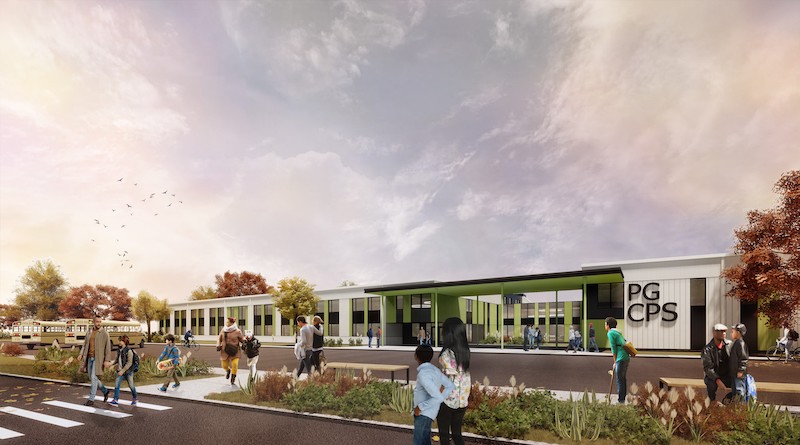Prince George’s County Public Schools is the second-largest school system in Maryland. It is also the second-oldest, with more than half of its 208 schools over 50 years old.
Like many school systems around the nation, Prince George’s faces rising enrollment with aging buildings and not enough seats. To address these shortfalls, the county has initiated an alternative construction financing program with some of the industry’s leading AEC firms, whose goal is to accelerate the time it takes to plan, finance, and build schools, and to reduce the cost of construction and maintenance.
COMMITMENT TO SMALL AND MINORITY BUSINESS PARTICIPATION
This consortium, known as Prince George’s County Education & Community Partners, this week broke ground on six K-8 and Middle schools whose completion is scheduled for the summer of 2023. The properties will be turned over to the consortium on July 1 to begin construction through a Public-Private partnership delivery approach. The consortium comprises Fengate Asset Management, an alternative investment manager focused on infrastructure, private equity, and real estate strategies; Gilbane Development Company (a financing member), Gilbane Building Company (the lead design-builder), Stantec (designer and AOR), and Honeywell (lead services provider).
Also see: Three AEC firms launch a mass timber product for quicker school construction
According to the Prince George’s County Public Schools “Blueprint Schools” website, Arel Architects, a certified county-based small business and minority business enterprise, is part of the design team and has a mentor protégé relationship with Stantec. Warren Builds Construction and Corenic Construction Group (also certified small and minority businesses) are on the construction team and have mentor protégé relationships with Gilbane. Three|E Consulting Group serves as the economic inclusion and compliance team.
The consortium is guaranteeing procurement of at least 30% of total eligible costs of the program to minority-owned businesses, community-based small businesses, and the creation of county-based jobs.
CUTTING THE PLAN-TO-BUILD TIME IN HALF
In Maryland, it typically takes seven years to plan and build a school. The consortium’s members believe the county’s alternative financing approach can cut that time in half, and save an aggregate of $174 million in deferred maintenance and construction costs for all six new schools, compared to a traditional construction procurement model.
The six schools under construction create 3,000 jobs and will result in upgraded facilities for more than 8,000 students and their families.
Prince George’s County claims to be the first public school system in the U.S. to leverage a full-scope alternative financing model to design, build, finance, and maintain a multi-school K-12 construction program.
“We have made tremendous strides in the area of long-range facility planning to advance from a capital program of primarily emergency repair projects toward a major modernization program with a plan to address each older facility in our inventory over the next 20 years,” says Dr. Monica Goldson, CEO of Prince George’s County Public Schools. “The Blueprint Schools initiative helps us accelerate delivery of new schools and modernizations for safe, sustainable, educational facilities to fully support 21st Century instruction for our students, staff, and community.”
Related Stories
| Aug 11, 2010
Gensler, HOK, HDR among the nation's leading reconstruction design firms, according to BD+C's Giants 300 report
A ranking of the Top 100 Reconstruction Design Firms based on Building Design+Construction's 2009 Giants 300 survey. For more Giants 300 rankings, visit http://www.BDCnetwork.com/Giants
| Aug 11, 2010
Gensler among eight teams named finalists in 'classroom of the future' design competition
Eight teams were recognized today as finalists of the 2009 Open Architecture Challenge: Classroom. Finalists submitted designs ranging from an outdoor classroom for children in inner-city Chicago, learning spaces for the children of salt pan workers in India, safe spaces for youth in Bogota, Colombia and a bamboo classroom in the Himalayan mountains.
| Aug 11, 2010
ASHRAE introduces building energy label prototype
Most of us know the fuel efficiency of our cars, but what about our buildings? ASHRAE is working to change that, moving one step closer today to introducing its building energy labeling program with release of a prototype label at its 2009 Annual Conference in Louisville, Ky.
| Aug 11, 2010
10 tips for mitigating influenza in buildings
Adopting simple, common-sense measures and proper maintenance protocols can help mitigate the spread of influenza in buildings. In addition, there are system upgrades that can be performed to further mitigate risks. Trane Commercial Systems offers 10 tips to consider during the cold and flu season.
| Aug 11, 2010
Jacobs, HOK top BD+C's ranking of the 75 largest state/local government design firms
A ranking of the Top 75 State/Local Government Design Firms based on Building Design+Construction's 2009 Giants 300 survey. For more Giants 300 rankings, visit http://www.BDCnetwork.com/Giants
| Aug 11, 2010
Suffolk breaks ground on colorful charter school in Boston
Suffolk Education has broken ground and began renovations and construction of a new $39.6 million facility to house the Boston Renaissance Charter Public School. The Suffolk team is renovating an existing, three-story mill building and warehouse in the Hyde Park section of Boston, Massachusetts, and constructing a 20,000 square-foot addition.
| Aug 11, 2010
PBK, DLR Group among nation's largest K-12 school design firms, according to BD+C's Giants 300 report
A ranking of the Top 75 K-12 School Design Firms based on Building Design+Construction's 2009 Giants 300 survey. For more Giants 300 rankings, visit http://www.BDCnetwork.com/Giants
| Aug 11, 2010
Turner Building Cost Index dips nearly 4% in second quarter 2009
Turner Construction Company announced that the second quarter 2009 Turner Building Cost Index, which measures nonresidential building construction costs in the U.S., has decreased 3.35% from the first quarter 2009 and is 8.92% lower than its peak in the second quarter of 2008. The Turner Building Cost Index number for second quarter 2009 is 837.







